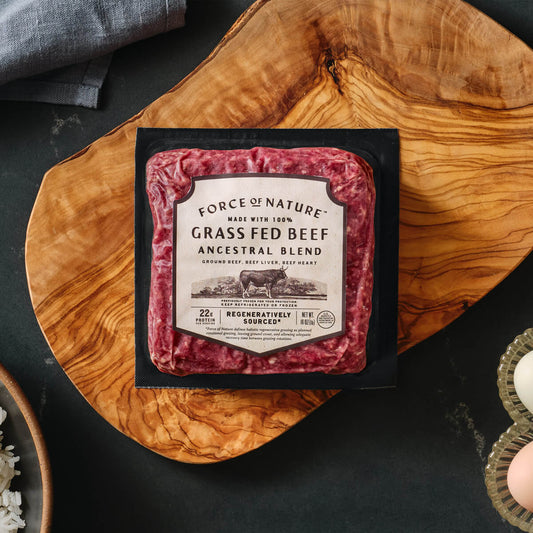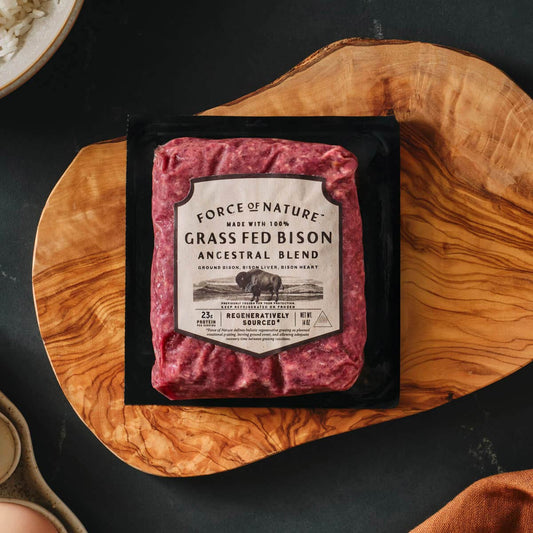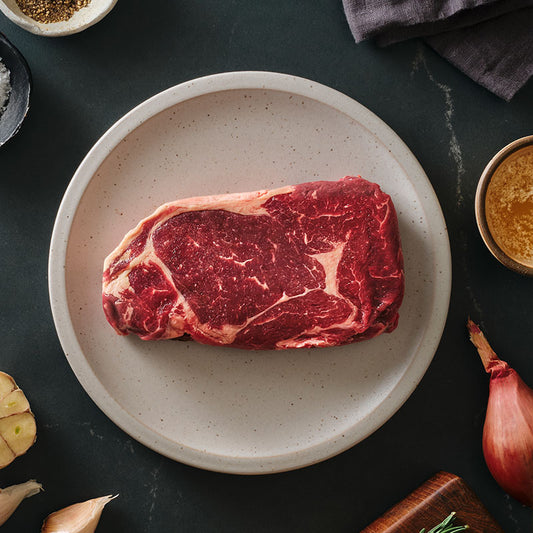Why Regeneratively Raised Meat is the Healthiest Choice for You and the Planet
Emily Wylie
In recent years, a growing number of health-conscious consumers are turning to meat raised through sustainable practices for its health benefits and lower environmental impact. Regenerative farming, a holistic approach that mimics natural ecosystems, offers an alternative to conventional farming by enhancing soil health, improving biodiversity, and providing meat that is nutritionally superior. At Force of Nature, we’ve built our mission around regenerative agriculture because it delivers on what matters most to you—health, sustainability, and flavor.
A recent comprehensive study by van Vliet et al. (2023) further underscores the advantages of regeneratively raised meat, particularly pasture-raised bison, compared to animals finished on grain in confined systems. With the largest profiling of meat ever conducted, the study revealed how pasture-finishing impacts the nutritional quality of meat and why it’s the best choice for both health-conscious consumers and the planet.
What is Regeneratively Raised Meat?
Regeneratively raised meat is produced through regenerative farming, a practice that prioritizes the health of ecosystems and animals. It goes beyond conventional organic farming by focusing on soil regeneration, biodiversity, and holistic management of land and livestock. At its core, regenerative farming involves rotating animals through pastures in a way that mimics natural grazing patterns. This allows the land to regenerate and sequester carbon while producing healthier, nutrient-dense meat.
The livestock raised on these regenerative pastures have more space to roam, access to diverse forage, and live in harmony with the environment. This approach stands in stark contrast to confined feeding operations, where animals are fed grain-heavy diets in limited spaces, which can negatively impact their health and the nutritional composition of their meat.

The Nutritional Benefits of Regeneratively Raised Meat
The study by van Vliet et al. (2023) highlights the significant health benefits of regeneratively raised, pasture-finished bison. By analyzing over 1,500 compounds in bison meat, the researchers found substantial differences between animals raised on pasture and those finished in confinement on grain. Here are the key reasons why regeneratively raised meat is nutritionally superior:
1. Higher Levels of Nutrients and Antioxidants
Pasture-finished bison showed higher levels of several key nutrients and antioxidants compared to their grain-finished counterparts. These nutrients contribute to a wide range of health benefits, from improved energy metabolism to better immune function.
- Mitochondrial Health & Energy Production: The study found that pasture-raised bison had 1.3 times higher levels of Krebs cycle metabolites, which are critical for energy production at the cellular level. These metabolites play a role in how efficiently the body can convert nutrients into usable energy. Choosing regeneratively raised meat means choosing a nutrient-dense protein that supports better energy metabolism, benefiting both the animals’ health and your own.
- Antioxidant-Rich Meat: Antioxidants are crucial for combating oxidative stress, which can lead to inflammation and chronic diseases. The study revealed that pasture-raised bison meat contained significantly higher levels of phenolic compounds (2.3 times), alpha-tocopherol (5.8 times), and carotene (2 times) compared to grain-finished bison. These compounds help reduce inflammation and support immune function, making regeneratively raised meat a powerful addition to your diet.
-
Omega-3 Fatty Acids: One of the standout findings in the study was the difference in the omega-6 to omega-3 ratio between pasture-finished and grain-finished bison. The omega-6 to omega-3 ratio in pasture-raised bison was 1.8, compared to 3.2 in grain-finished bison. Omega-3 fatty acids, such as EPA and DPA, are essential for heart health, brain function, and reducing inflammation. A better omega-6 to omega-3 ratio is linked to reduced risk of chronic diseases like heart disease, making pasture-raised meat a better choice for health-conscious consumers.
2. Lower Inflammatory Markers
One of the biggest concerns for those seeking a healthier diet is the impact of food on inflammation. Chronic inflammation is linked to a range of diseases, including heart disease, diabetes, and cancer. The study found that regeneratively raised bison had significantly lower levels of inflammatory markers and oxidative stress.
- Reduced Oxidative Stress: Oxidative stress occurs when there’s an imbalance between free radicals and antioxidants in the body, leading to cell damage. The study found that pasture-raised bison had lower levels of oxidative stress markers compared to grain-finished animals. This suggests that regeneratively raised meat may have a less inflammatory impact on the body, supporting overall health and longevity.
- Lower Levels of Harmful Compounds: The meat from pasture-raised bison also contained lower levels of advanced glycation end products (AGEs), compounds that form when protein or fat combine with sugar in the bloodstream. AGEs are known to contribute to aging and the development of degenerative diseases. By choosing regeneratively raised meat, you’re reducing your exposure to these harmful compounds and promoting better long-term health.
3. Healthier Fat Composition
Not all fats are created equal, and regeneratively raised meat provides a healthier balance of fats compared to grain-finished alternatives. The study found that pasture-raised bison had lower levels of unhealthy fats and higher levels of fats that are more easily utilized by the body for energy.
- Lower Triacylglycerol (TAG) Levels: TAGs are a type of fat linked to an increased risk of heart disease when present in high levels. Pasture-raised bison had significantly lower levels of TAGs compared to grain-finished bison, making it a heart-healthy choice for those looking to maintain a balanced diet.
- Higher Long-Chain Acyl Carnitines: Long-chain acyl carnitines help transport fatty acids into cells to be used for energy rather than being stored as fat. The study found that pasture-raised bison had higher levels of these beneficial compounds, further supporting the idea that regeneratively raised meat is a leaner, healthier source of protein.
- Better Omega-6 to Omega-3 Ratio: With a ratio of 1.8, the omega-6 to omega-3 balance in regeneratively raised bison is much closer to the ideal ratio recommended by health experts. A diet with a better balance of omega-3s can help reduce inflammation, support heart health, and improve mental clarity. This makes regeneratively raised meat a smarter choice for anyone looking to optimize their health.

The Environmental Benefits of Regenerative Farming
While the nutritional benefits of regeneratively raised meat are compelling, it’s also important to recognize the positive impact regenerative farming has on the environment. Conventional farming practices, especially those involving confined feeding operations, often deplete the land and contribute to environmental degradation. Regenerative farming, on the other hand, is a restorative process that works in harmony with nature.
- Soil Health: Regenerative farming practices like rotational grazing improve soil health by encouraging biodiversity and promoting the growth of healthy plants. Healthy soil is better able to retain water, sequester carbon, and support the ecosystem, which makes regenerative farming a vital tool in the fight against climate change.
- Carbon Sequestration: One of the key benefits of regenerative farming is its ability to sequester carbon in the soil. By promoting plant growth and allowing animals to graze naturally, regenerative farming pulls carbon from the atmosphere and stores it in the soil. This not only reduces greenhouse gases but also improves the quality of the soil for future generations.
- Biodiversity: Regenerative farming supports a diverse range of plant and animal species, creating a more resilient ecosystem. By rotating animals through different pastures, regenerative farmers mimic natural grazing patterns, which helps maintain healthy plant diversity and prevents overgrazing. This biodiversity is essential for the long-term sustainability of our food systems.
Regeneratively Raised Meat: The Best Choice for Health-Conscious Consumers
For health-conscious consumers seeking nutrient-dense, sustainably raised meat, the choice is clear. Regeneratively raised meat offers numerous health benefits, from better fat composition to higher antioxidant levels. It’s also a more humane and environmentally friendly option, supporting ecosystems and promoting animal welfare.
By choosing regeneratively raised meat, you’re making a positive impact on both your health and the planet. Here’s a quick recap of why regeneratively raised meat is the best option for health-conscious consumers:
- Nutrient Density: Packed with omega-3s, antioxidants, and energy-boosting metabolites, regeneratively raised meat provides a higher level of nutrition compared to grain-finished alternatives.
- Anti-Inflammatory Benefits: Lower levels of oxidative stress and harmful compounds make regeneratively raised meat a great choice for reducing inflammation and supporting overall health.
- Healthier Fats: The superior fat composition of regeneratively raised meat supports heart health, metabolism, and balanced energy levels.
- Sustainable and Ethical: Regenerative farming not only produces healthier meat but also helps combat climate change, improve soil health, and promote biodiversity.
At Force of Nature, we are proud to offer a wide range of regeneratively raised meats. Our commitment to regenerative farming ensures that every serving of our meat is packed with nutrients, sustainably sourced, and incredibly delicious.
Conclusion: Your Health, Your Planet, Your Choice
Choosing regeneratively raised meat is more than just a dietary decision; it’s a choice that impacts the health of our planet and future generations. By opting for nutrient-dense, pasture-raised meats, you’re supporting sustainable farming practices that restore the land, improve animal welfare, and promote human health. Whether you’re looking to boost your energy levels, reduce inflammation, or make a positive environmental impact, regeneratively.
RELATED BLOGS:
- Regenerative Agriculture and the Health Benefits of Regeneratively Raised Meat
- Soil and the Gut: Two Ecosystems with a Deep Connection







